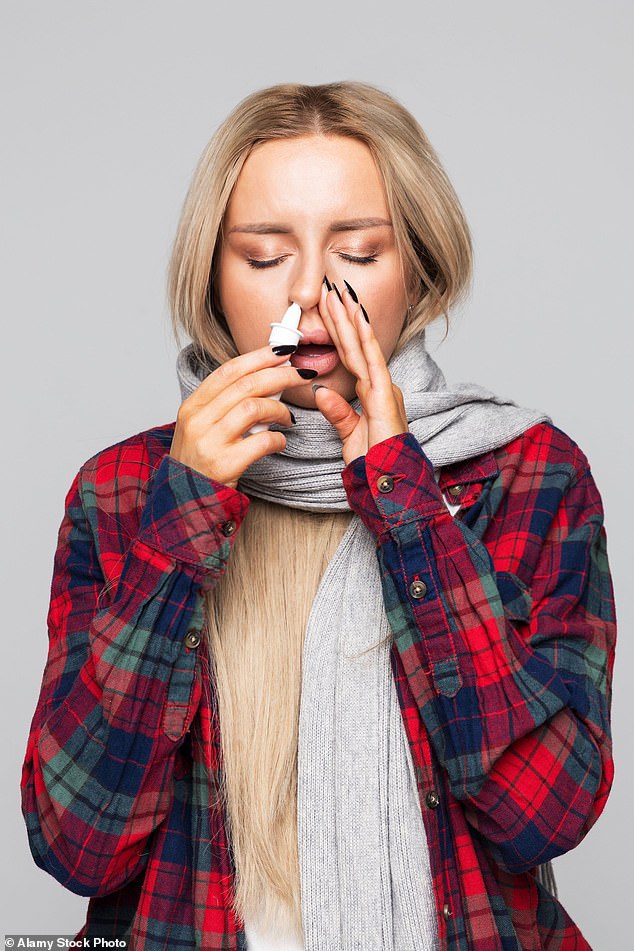An £8 nasal spray helps you recover faster from a cold, a major new study claims... but virus experts say there's a simple method you can follow to get the same result at a fraction of the cost
Expensive branded nasal sprays cut the length of a cold by at least three days, a major trial found — but a cheap homemade alternative can be just as effective.
Scientists compared Vicks First Defence, which claims to 'stop a cold in its tracks' and costs £8 a bottle, with a simple saline nasal spray.
They found that both sprays slashed the length of time that patients felt unwell when used in the early stages of an infection.
But the pricey Vicks version did not fare any better than the saline one, which can be made at home from boiled tap water, salt and a pinch of baking soda.
The trial, conducted by Southampton University and published in the Lancet journal, studied 19,475 people over three winters. Half of them came down with a cold at some point during the trial.

Nasal sprays can reduce the length of a cold by at three days, if used three times a day. Researchers believe they could be twice as effective if used six times a day


The researchers found Vicks First Defence was very effective at fighting colds, but the simple saline solution spray worked just as well
Those who used the sprays did so three times a day when they had a tickle in their nose, and got better in 12 days. People who did not use them took 15 days to recover.
Lead researcher Professor Paul Little believes the sprays could be twice as effective if they are used six times a day, rather than three.
He said: 'We had quite remarkable results. I think this is essentially a game changer for the common cold.
'The Vicks one contains a mild acid that supposedly kills viruses, and a polymer molecule that mops them up.
'But we found the saline solution was just as effective.
'We believe these sprays are effective because they wash the viruses to the back of the throat, so they can be swallowed down to the stomach.'
The study found those who used the sprays became significantly less likely to seek out antibiotics from their doctor, which could stem the rising problem of antibiotic resistance.

Professor Paul Little says antibiotic resistance is a 'looming iceberg of a public health problem'
'By 2050, there will be more deaths from antibiotic resistance than cancer, diabetes and a few other things,' said Professor Little.
'It's a looming iceberg of a public health problem for us. So to find something really simple and cheap, that anybody can get and is so effective, is just brilliant.
'It could make quite a difference in the annual winter health crises that we have.'
He added isotonic saline is easily found at most pharmacies and a one litre bottle can be bought for the same price as a 15ml of Vicks First Defence.
Alternatively, saline can be made at home using boiled tap water, salt and baking soda.
Professor Little said his team is working on an easy recipe that people can recreate at home.
'It's very simple to make, but you have to have the right amounts,' he said.
The trial was not sponsored by Vicks and the researchers had to buy all the bottles they used, he added.
Professor John Tregoning, of Imperial College London, said: 'Colds are a major burden on the healthcare system and the wider economy, due to days taken off as sick leave.
'They can also further worsen some conditions such as Chronic Obstructive Pulmonary Disease (COPD).
'While they are mostly caused by viruses, there are some bacteria that also infect the nose and lungs and this uncertainty has led to widespread antibiotic prescription, which in turn has contributed to bacteria becoming resistant to this vital class of drugs.
'Ways to shorten the time we feel ill would be a benefit to both individuals and society.'
He added the study demonstrates that non-antibiotic treatments are important, but most colds are viral and 'self resolving', so don’t need any drugs to get better.
'Time is the best healer,' he said.
















































































































































































































































































































































































































